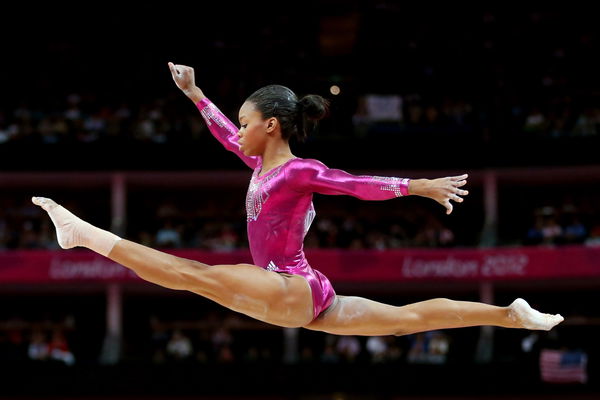
via Getty
LONDON, ENGLAND – AUGUST 02: Gabrielle Douglas of the United States competes on the balance beam in the Artistic Gymnastics Women’s Individual All-Around final on Day 6 of the London 2012 Olympic Games at North Greenwich Arena on August 2, 2012 in London, England. (Photo by Streeter Lecka/Getty Images)

via Getty
LONDON, ENGLAND – AUGUST 02: Gabrielle Douglas of the United States competes on the balance beam in the Artistic Gymnastics Women’s Individual All-Around final on Day 6 of the London 2012 Olympic Games at North Greenwich Arena on August 2, 2012 in London, England. (Photo by Streeter Lecka/Getty Images)
In the ever-evolving landscape of college sports, a significant shift has occurred with the advent of the post-NIL (Name, Image, Likeness) Era. Athletes are no longer forced to choose between pursuing their passion in collegiate sports and reaping financial rewards through sponsorship deals. This transformation has opened doors for Olympians to not only maintain their collegiate eligibility but also compete professionally.
Jordyn Wieber, a remarkable Olympic gold medalist and part of the famed ‘Fierce Five’ from the 2012 Summer Olympics, has revealed a surprising truth about the challenging choices faced by gymnasts like her. Jordyn Wieber, affectionately known as Jo, is now the head coach for the University of Arkansas Razorback Gymnastics team. Recently she reflected on her career and the impact of the post-NIL era on the gymnasts in contemporary times.
ADVERTISEMENT
Article continues below this ad
Tough Decisions Jordyn Wiever Had to Make in the Past
Wieber?s illustrious gymnastics career forced her to make a tough choice at a young age. In a recent interview with Arkansas Money & Politics, she explained, ?When I was competing, I had to make a choice between whether or not I wanted to go professional, meaning I was really making a choice between whether I was going to accept endorsements and money.??

via Imago
Jordyn Wieber ? Credits: ESPN
The dilemma faced by Wieber exemplifies the challenging dichotomy between financial gain and personal passion that many Olympic-level athletes including gymnasts confronted in the past. On the one hand, the lure of professional success, financial stability, and recognition. On the other, the desire to compete in collegiate gymnastics.
This choice was critical because traditionally, athletes who accepted endorsements could not compete collegiately. Ultimately, Wieber chose to go professional, leaving behind the prospect of collegiate gymnastics. She was just 17 years old during the 2012 London Olympics and announced her retirement at 19, missing out on collegiate gymnastics. She said in the interview, ?In my day, you had to make a choice early on, and I am so glad that our athletes no longer have to make that choice.?
Major Shift in Balancing Athletic and Financial Pursuits in the Post-NIL Era
Wieber highlighted the game-changing impact of the post-NIL era in college sports and professional athleticism. Athletes no longer need to choose between competing professionally and collegiately. Wieber thinks this is a good sign for future generations of aspiring athletes and gymnasts.
ADVERTISEMENT
Article continues below this ad

via Getty
ST LOUIS, MISSOURI – JUNE 25: Sunisa Lee competes on vault during day 2 of the women’s 2021 U.S. Olympic Trials – Gymnastics at America?s Center on June 25, 2021 in St Louis, Missouri. (Photo by Carmen Mandato/Getty Images)
?We?re seeing two really positive things coming from NIL,? stated in the interview with sources. ?One is that athletes that are Olympians or that have already gone professional are now signing with college teams, which is increasing the fan base and viewership. We?re also seeing a lot of college athletes who are gaining opportunities to compete in the Olympics.??
Read More- ?Diamond in the Rough?: Minneapolis Teenager Set on Course to Make Gymnastics History
ADVERTISEMENT
Article continues below this ad
Jordyn Wieber?s journey from Olympic glory to coaching the University of Arkansas Razorback Gymnastics team is a testament to her passion for the sport. Her story sheds light on the challenges gymnasts faced in the past, torn between financial gain and collegiate dreams. The advent of NIL rules has created a new platform, enabling athletes to balance both. Wieber?s dedication to coaching and her commitment to nurturing not just gymnastics skills but also life lessons reflect her holistic approach.
Watch this Story- Simone Biles Shows Off Her Support for Jonathan Owens in a Customized Outfit
ADVERTISEMENT
ADVERTISEMENT
ADVERTISEMENT
